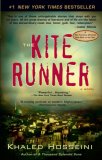Summary | Excerpt | Reading Guide | Reviews | Readalikes | Genres & Themes | Author Bio

Hassan never talked about his mother, as if she’d never existed. I always wondered if he dreamed about her, about what she looked like, where she was. I wondered if he longed to meet her. Did he ache for her, the way I ached for the mother I had never met? One day, we were walking from my father’s house to Cinema Zainab for a new Iranian movie, taking the shortcut through the military barracks near Istiqlal Middle School—Baba had forbidden us to take that shortcut, but he was in Pakistan with Rahim Khan at the time. We hopped the fence that surrounded the barracks, skipped over a little creek, and broke into the open dirt field where old, abandoned tanks collected dust. A group of soldiers huddled in the shade of one of those tanks, smoking cigarettes and playing cards. One of them saw us, elbowed the guy next to him, and called Hassan.
"Hey, you!" he said. "I know you."
We had never seen him before. He was a squatty man with a shaved head and black stubble on his face. The way he grinned at us, leered, scared me. "Just keep walking," I muttered to Hassan.
"You! The Hazara! Look at me when I’m talking to you!" the soldier barked. He handed his cigarette to the guy next to him, made a circle with the thumb and index finger of one hand. Poked the middle finger of his other hand through the circle. Poked it in and out. In and out. "I knew your mother, did you know that? I knew her real good. I took her from behind by that creek over there."
The soldiers laughed. One of them made a squealing sound. I told Hassan to keep walking, keep walking.
"What a tight little sugary cunt she had!" the soldier was saying, shaking hands with the others, grinning. Later, in the dark, after the movie had started, I heard Hassan next to me, croaking. Tears were sliding down his cheeks. I reached across my seat, slung my arm around him, pulled him close. He rested his head on my shoulder. "He took you for someone else," I whispered. "He took you for someone else."
I’m told no one was really surprised when Sanaubar eloped. People had raised their eyebrows when Ali, a man who had memorized the Koran, married Sanaubar, a woman nineteen years younger, a beautiful but notoriously unscrupulous woman who lived up to her dishonorable reputation. Like Ali, she was a Shi’a Muslim and an ethnic Hazara. She was also his first cousin and therefore a natural choice for a spouse. But beyond those similarities, Ali and Sanaubar had little in common, least of all their respective appearances. While Sanaubar’s brilliant green eyes and impish face had, rumor has it, tempted countless men into sin, Ali had a congenital paralysis of his lower facial muscles, a condition that rendered him unable to smile and left him perpetually grim-faced. It was an odd thing to see the stone-faced Ali happy, or sad, because only his slanted brown eyes glinted with a smile or welled with sorrow. People say that eyes are windows to the soul. Never was that more true than with Ali, who could only reveal himself through his eyes.
I have heard that Sanaubar’s suggestive stride and oscillating hips sent men to reveries of infidelity. But polio had left Ali with a twisted, atrophied right leg that was sallow skin over bone with little in between except a paper-thin layer of muscle. I remember one day, when I was eight, Ali was taking me to the bazaar to buy some naan. I was walking behind him, humming, trying to imitate his walk. I watched him swing his scraggy leg in a sweeping arc, watched his whole body tilt impossibly to the right every time he planted that foot. It seemed a minor miracle he didn’t tip over with each step. When I tried it, I almost fell into the gutter. That got me giggling. Ali turned around, caught me aping him. He didn’t say anything. Not then, not ever. He just kept walking.
Ali’s face and his walk frightened some of the younger children in the neighborhood. But the real trouble was with the older kids. They chased him on the street, and mocked him when he hobbled by. Some had taken to calling him Babalu, or Boogeyman. "Hey, Babalu, who did you eat today?" they barked to a chorus of laughter. "Who did you eat, you flat-nosed Babalu?"
From The Kite Runner by Khaled Hosseini, copyright © 2003 Khaled Hosseini, published by G. P. Putnam's Sons, a member of Penguin Group (USA) Inc., all rights reserved, reprinted with permission from the publisher.
There is no such thing as a moral or immoral book. Books are either well written or badly written. That is all.
Click Here to find out who said this, as well as discovering other famous literary quotes!
Your guide toexceptional books
BookBrowse seeks out and recommends the best in contemporary fiction and nonfiction—books that not only engage and entertain but also deepen our understanding of ourselves and the world around us.